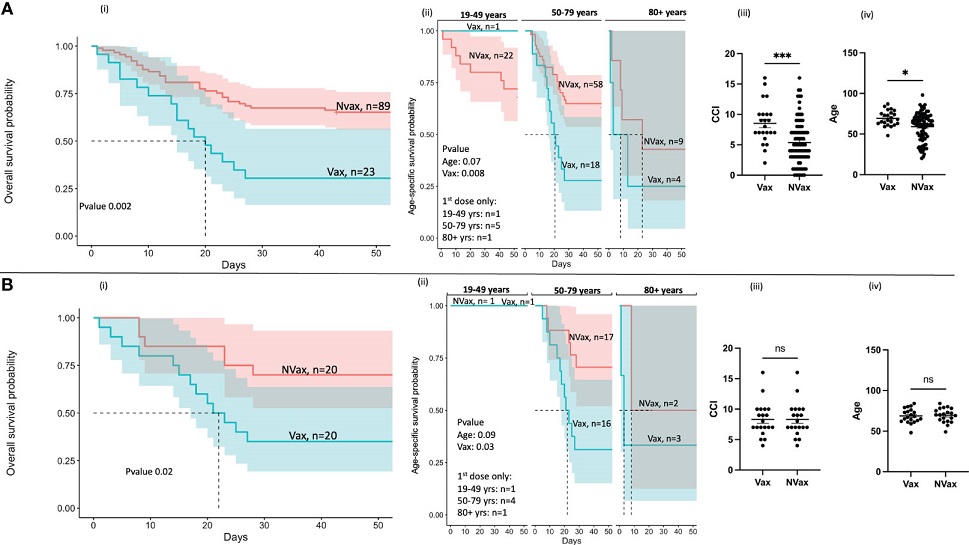BREAKING! Ohio Study Finds That Vaccinated Hospitalized COVID-19 Patients Are At A Higher Risk For Mortality Compared To The Unvaccinated!
Nikhil Prasad Fact checked by:Thailand Medical News Team Mar 21, 2024 1 year, 8 months, 3 weeks, 1 day, 21 hours, 25 minutes ago
COVID-19 News: The landscape of COVID-19 vaccination and its repercussions on mortality rates among hospitalized patients have been areas of intense focus and analysis. A recent in-depth study conducted at The Ohio State University in Wooster and Columbus, Ohio, USA, that is covered in this
COVID-19 News report, has provided novel insights into this multifaceted issue. The study aimed to delve deep into the relationship between vaccination status, antibody responses, and mortality rates in COVID-19 patients with acute respiratory failure (ARF) and various comorbidities.
 Vaccinated Hospitalized COVID-19 Patients Are At A Higher Risk For Mortality Compared To The Unvaccinated
Kaplan-Meier survival analysis of SARS-CoV-2 infected patients before (A) and after (B) adjustment for Charlson’s Comorbidity Index (CCI). (i) Overall survival probability of the Vax and NVax SARS-CoV-2-infected patients (ii) Age-specific survival probability of the Vax and NVax patients from the three age groups (19-49 years, 50-79 years, and 80+ years), (iii) Scatter plots (median, 95%CI) showing CCI and (iv) age of the Vax vs. NVax patients. The dotted lines on the survival plots represent the median survival time. Shaded area represents a 95% confidence interval. Differences were considered significant at a p-value < 0.05(*), and <0.001(***). ns, non-significant.
Navigating the Complexities of COVID-19 Vaccination and Mortality
Vaccinated Hospitalized COVID-19 Patients Are At A Higher Risk For Mortality Compared To The Unvaccinated
Kaplan-Meier survival analysis of SARS-CoV-2 infected patients before (A) and after (B) adjustment for Charlson’s Comorbidity Index (CCI). (i) Overall survival probability of the Vax and NVax SARS-CoV-2-infected patients (ii) Age-specific survival probability of the Vax and NVax patients from the three age groups (19-49 years, 50-79 years, and 80+ years), (iii) Scatter plots (median, 95%CI) showing CCI and (iv) age of the Vax vs. NVax patients. The dotted lines on the survival plots represent the median survival time. Shaded area represents a 95% confidence interval. Differences were considered significant at a p-value < 0.05(*), and <0.001(***). ns, non-significant.
Navigating the Complexities of COVID-19 Vaccination and Mortality
The COVID-19 pandemic has posed unprecedented challenges globally, particularly for individuals with underlying health conditions. Vaccination campaigns have been claimed to have played a pivotal role in curbing severe illness and reducing hospitalization rates across diverse demographics. However, questions have arisen regarding the nuanced impact of vaccines on mortality rates, especially among subsets of patients with preexisting health concerns. This comprehensive study sought to elucidate these intricacies by analyzing a cohort of hospitalized COVID-19 patients with ARF.
Study Design and Methodology: Unraveling Key Findings
The study encompassed 152 adult patients admitted to The Ohio State University hospital between May 2020 and November 2022, comprising both COVID-19-positive and COVID-19-negative individuals with ARF. Among the COVID-19-positive patients, 23 had received the SARS-CoV-2 vaccine (Vax), while 89 remained unvaccinated (NVax).
Notably, the mortality rate was strikingly higher among vaccinated COVID-19 patients (70%) compared to their unvaccinated counterparts (37%).
This unexpected disparity challenges conventional assumptions regarding the universal efficacy of vaccination in reducing mortality risk among hospitalized COVID-19 patients.
Further examination of the data revealed intriguing insights into the factors influencing mort
ality outcomes. Vaccinated patients exhibited higher Charlson’s Comorbidity Index (CCI) scores, indicative of a greater burden of preexisting health conditions. Even after adjusting for these comorbidities, the mortality risk remained significantly elevated in vaccinated individuals, suggesting the presence of additional contributing factors beyond underlying health conditions.
Discussion: Unpacking the Implications
The study's findings prompt a deeper exploration of the intricate interplay between vaccination status, comorbidities, and mortality risk in COVID-19 patients.
While vaccines have been claimed to have played a role in mitigating severe illness and hospitalization, their impact on mortality outcomes among hospitalized patients appears to be more nuanced and multifaceted.
One plausible explanation for the higher mortality rates among vaccinated patients could stem from aberrant immunological responses. The study observed lower levels of SARS-CoV-2 antibodies in vaccinated non-survivors, implying a potential inadequacy of immune protection conferred by vaccination in certain individuals.
Additionally, an increase in total IgG4 antibodies, associated with immune tolerance, was noted in vaccinated COVID-19 patients, highlighting the complex dynamics of post-vaccination immune responses.
Limitations and Future Directions: Navigating Complexity
Despite the valuable insights gleaned from this study, several limitations warrant consideration. The relatively small sample size and the absence of detailed data on individual comorbidities underscore the need for further research with larger cohorts and comprehensive comorbidity profiles. Additionally, longitudinal studies tracking immune responses over time could provide a more nuanced understanding of the evolving dynamics of post-vaccination immunity and its impact on clinical outcomes.
In conclusion, while COVID-19 vaccination is still being touted as a cornerstone in combating the pandemic, its implications on mortality risk among hospitalized patients necessitate ongoing investigation and refinement of vaccination strategies. Understanding the multifaceted factors contributing to mortality differences between vaccinated and unvaccinated individuals will be pivotal in optimizing outcomes for COVID-19 patients, particularly those with complex health needs. This study serves as a stepping stone towards unraveling the complexities of COVID-19 vaccination and mortality, paving the way for informed decision-making and targeted interventions in clinical practice.
The study findings were published in the peer reviewed journal: Frontiers in Immunology.
https://www.frontiersin.org/journals/immunology/articles/10.3389/fimmu.2024.1325243/full (The study includes a corrigendum that does not affect the results nor the conclusion!)
For the latest
COVID-19 News, keep on logging to Thailand Medical News.
